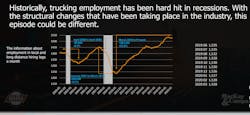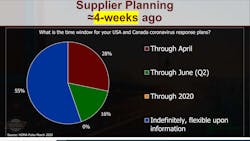CV experts brace for continued declines in the COVID-19 era
The outlook for commercial vehicle (CV) suppliers has been bleak, and because there are more questions than answers right now concerning the COVID-19 pandemic, it isn’t projected to get better anytime soon.
CV experts have seen a two-year decline as both prices and sales have plummeted across all segments — on- and off-highway, OE, OES and independent aftermarket — with sales falling into the negative territory in the third quarter of 2019. Now, the spread of COVID-19 has led to an even more dismal outlook, and analysts project it will lead to a third consecutive quarter of declining sales.
The Heavy Duty Manufacturers Association (HDMA) and MacKay & Company held the first of what is expected to be a series of webinars on the impact of coronavirus on CV. During the April 8 webinar, Richard Anderson, director of market research and analysis for HDMA, explained that the OE Class 8 production estimate for HDMA members was well below 200,000 units when just a year ago they were in excess of 310,000 or 315,000. Construction, agriculture, mining and off-highway are all down, leading to an “overall very pessimistic outlook,” he pointed out.
“COVID-19 has done nothing to help this. There are three main concerns for suppliers: forecast accuracy, demand volatility and overall weakening of sales,” he said. “Over the last two years, we have seen steady decreases in the levels of hiring, production and inventory. The projected challenge for 2020 was compensating for the overbuild versus natural replacement on the OE side and capacity absorption across all parts of the business. The pandemic has done nothing to improve these underlying challenges that our members felt they would be facing this year.”
Bob Dieli, an economist with MacKay & Company, cited preliminary U.S. Bureau of Labor Statistics (BLS) data indicating the U.S. economy shed more than 701,000 jobs in March. He explained that number is on the low side and will likely increase, as BLS labor surveys occur in the middle of each month. Dieli added that trucking employment always takes a hit during recessions and is something to keep an eye on.Dieli projected the likelihood of a structural “W-shaped” recession, meaning there will be enough changes taking place to suggest that the economy will not operate the same way it did before COVID-19.
It is unknown how large the first leg of the W will be and how long it will take to reach its ultimate length, explained Dieli. The second leg of the W will consist of the efforts to rebuild the supply chain as well as the effects of people going back to work. This is where we will likely see a boost in economic activity.
“The third leg of the W, that second down, I think is going to be a result of kinks in the supply chain,” he added. “We have dislocated the supply chain as well as stretched it out. Eventually, we will get to the final leg of the W, which will show the resumption of activity.”
Over the past four weeks since the COVID-19 outbreak in the U.S., HDMA researchers and analysts report that roughly 61 percent of suppliers in North America have closed their facilities. And 52 percent of members have received force majeure letters from their suppliers explaining closures.
Force majeure refers to uncontrollable events that are not the fault of any party and that make it difficult or impossible to carry out normal business.
“The biggest thing that we really need to pay attention to is jumps in those force majeure letters and the closure of facilities,” Anderson explained. “The cascading delays throughout the supply chain will be a theme that you will see throughout all our data. That is the concern for most of our members.
“This is a rapidly changing situation,” he added. “Our goal is to see when we sort of plateau, which might give us a good indication of when things could start turning around.”
At the start of the COVID-19 pandemic in the U.S., which was about a month ago, HDMA asked its members what their window was for developing COVID-19 response plans. At the time, 55 percent of respondents knew this was something they didn’t have a good handle on, so they delayed their plans indefinitely. Now, according to Anderson, more like 75 percent of HDMA members would likely delay their response plans indefinitely.“We have come to the conclusion that we don’t really know how this is all going to work out,” he reiterated. “Yes, we believe we will get through it. Yes, people are making sane and rational responses now. But we still don’t know the duration of this, and that’s the important thing to keep in mind as we look through all our data. There is so much unknown at this point.”
Supplier shipping delays
As Anderson pointed out, there is a risk of cascading shipping and production delays. Approximately 15 percent of HDMA’s supply community is reporting that they have unknown delays of inbound product; they have no idea when the product is going to arrive or if it is going to arrive from the source they initially bought it from.
HDMA also reported that 11.5 percent of all shipments inbound are delayed, while 7.4 percent of shipments outbound are delayed.
What is particularly noteworthy is that over the course of two weeks, just 11 percent of suppliers said they had no inbound delays compared to 22 percent of suppliers two weeks prior. And 54 percent of suppliers said two weeks ago that they were experiencing no outbound shipping delays. Over the course of two weeks, that number has dropped to 29 percent experiencing no delays.
Additionally, in the last two weeks, HDMA members indicated that their top concerns are the loss of their labor force, quarantine driving down freight volumes, a complete drop-off from customer order activity, and the health and wellbeing of their employees.
“People are concerned about the length and duration of mandated closures and quarantine efforts,” Anderson explained. “We see concerns around the supply chain and cascading shipping delays. A major concern for suppliers is what is going to happen in general to our economy. The impact of COVID-19 is built on a weakening economy and forecasts for a slowing year. This hasn’t helped any of that.”
John Blodgett, vice president of sales and marketing at MacKay & Company, explained that commercial fleets reported that their average weekly miles were down by 6 percent during the pandemic. Approximately 35 percent of fleet respondents surveyed said they reduced employee hours, while 9 percent laid-off employees and 8 percent closed locations.
Ultimately, Dieli advised the more than 400 listeners who tuned into the webinar not to “overrun the data” and to take the time to gather credible information.
“We will inform you as we get information. We will try to answer any questions you may have,” he said. “In the meantime, please stay safe. We will get through this. We are smart, we are resourceful, and this is a solvable problem.”


